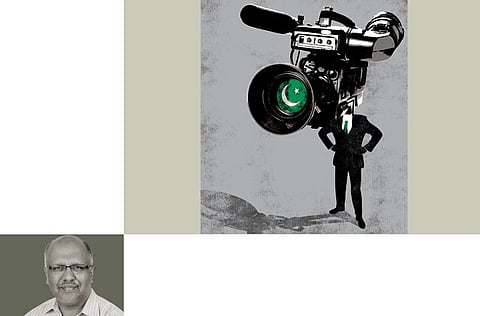Who will watch the watchdog?
There are compelling questions related to media that must be resolved

A week of high drama is not unknown in Pakistan as the country is often caught in the proverbial ‘eye-of-the-storm’. But the past week has been unusually dramatic even by the standards of Pakistan’s moments of recurring turmoil and continuing uncertainty.
This latest episode began when media reports raised questions over the conduct of a son of Pakistan’s Supreme Court Chief Justice, Iftikhar Mohammad Chaudhary. Arsalan, Justice Chaudhary’s son, reportedly received large sums of money from Malek Riaz, Pakistan’s best-known realty tycoon.
In the wake of the controversy, the Supreme Court has stepped in to investigate the matter. However, in the meantime, the storm has widened to bring out some very disturbing questions over the conduct of prominent players across Pakistan’s increasingly robust media.
Claims across the Internet suggest that a number of Pakistani journalists, including some very high-profile ones, also received large payoffs from Riaz. As expected, the claims have been rebutted by some of those targeted in the allegations.
However, the matter cannot be taken lightly. In the past decade, Pakistan’s media has emerged as the most visible example of an increasingly open country where democratic values have rapidly taken root. This evolution has armed the Pakistani media with the reputation of being an emerging watchdog.
But the status of watchdog notwithstanding, parts of Pakistan’s media, notably the country’s TV channels, have also acquired the reputation of behaving without any restraint. The latest controversy in Pakistan only deepened when Riaz was shown in an interview with a private TV channel, questioning the conduct of Justice Chaudhary.
More damaging for Pakistan’s emerging private media has indeed been the leakage of video footage on the Internet, which clearly showed exchanges between Riaz and two prominent TV hosts during breaks in that interview, which. in part. could at least be construed as being potentially offensive to the top judiciary. Last Friday, justice Chaudhary presided over a special session, with other Supreme Court judges present on his side, to review the footage and decide the best way forward.
Irrespective of how the judges will proceed from here, there are indeed compelling questions related to the media itself which must be debated and resolved.
For example, should a free media environment allow completely unfettered space to TV channels, in particular to reporting, discussing and debating subject matters without adhering to laws or moral obligations. Even before the latest controversy erupted, these were compelling concerns related to the evolution of Pakistan’s TV channels with examples of matters being tackled in a blatantly one-sided way.
More troubling, however, are the questions over payoffs having been made to some of Pakistan’s most visible TV personalities. A simple rebuttal from those criticised is just not enough to clear the record. Given the centrality of the media in influencing opinions in any country, it’s absolutely vital that these questions be aggressively followed through with impartial investigations. An independent probe is necessary to probe those accused of receiving large pay-offs to ensure that this is not repeated in the future.
The controversy also raises some very serious questions about the ways in which Pakistan has opened up space to private TV networks without ensuring a watertight regime to oversee their conduct. The government-appointed Pakistan Electronic Media Regulatory Authority (Pemra) has existed but tragically at times just in name. If indeed Pemra was already conducting an independent enough process to investigate controversial content on Pakistan’s private TV channels, the Supreme Court may not have had to eventually step into the scene.
This overall tightening is not just essential for the sake of protecting Pakistan’s ordinary citizens from being exploited, but is absolutely essential to redeem the reputation of the media which, in the wake of the ongoing controversy, will likely be subjected to more public scepticism.
While a free media is central to the successful evolution of any democratic society, no entity in a free environment must ever be allowed to carry on its work without some element of independent oversight. Tragically, in Pakistan’s case, it seems that the country’s rapidly evolving free media has flourished without legitimate constraints. Pakistan is haunted today by a question that should have been asked when this evolution began in the first place, which is: Who will watch the watchdog?
Farhan Bokhari is a Pakistan-based commentator who writes on political and economic matters.



